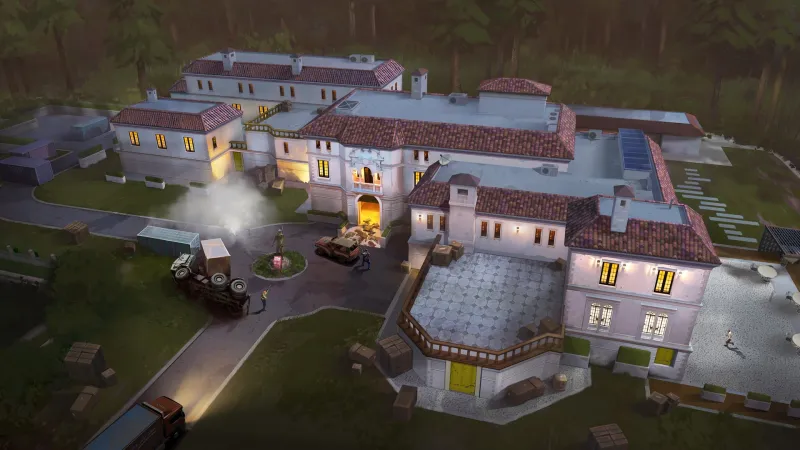Reading List
The most recent articles from a list of feeds I subscribe to.
Paranormasight: The Mermaid's Curse Brings Underwater Horrors This February

Square Enix's spine-tingling Paranormasight is getting a follow-up. Paranormasight: The Mermaid's Curse will arrive in just two weeks, on February 19, 2026.
The first Paranormasight was released in 2023, to a generally positive reception. It told the tale of a spiritual battle royale, where people tried to bring their loved ones back from the dead by emerging as the sole victor. Now, it's getting a follow-up with The Mermaid's Curse.
This new story heads to Ise-Shima, Japan and follows Yuza, a pearl diver who encounters another version of himself in the water. Several other strangers gather on the island as well, and the investigation into the supernatural starts to unfold.
Paranormasight: The Mermaid's Curse looks to have many of the same mechanics of the original Paranormasight: a flowchart of different characters' perspectives, puzzles to solve, and plenty of creepy moments to give you chills.
Paranormasight: The Mermaid's Curse arrives on the Nintendo Switch on February 19, 2026, with pre-orders beginning later today.
Orbitals, The Anime-Inspired Co-Op Puzzle Game, Launches Exclusively On Switch 2 This Summer

Developer Shapefarm and publisher Kepler Interactive have released a new trailer for Orbitals, the classic anime-inspired co-op puzzle game, and it reveals the game will launch exclusively on Nintendo Switch 2 sometime this summer. As for an exact release date, we'll have to wait a bit longer to find out.
The new Orbitals trailer, which aired during today's Nintendo Direct: Partner Showcase, should tide you over, though, as it highlights the game's amazing art alongside new features like playing drums and piano with a friend, arcade cabinet minigames, and more. Inspired by classic 1990s anime like Neon Genesis Evangelion and Cowboy Bebop, this new trailer offers more details about the dual protagonists, Maki and Omura, who must brave the perils of space to save the crumbling space station they call home from a destructive, supernatural cosmic storm.
Check out the new Orbitals trailer for yourself below:
Orbitals is being developed in Unreal Engine 5 and, thanks to its Switch 2 exclusivity, will allow players to team up with two pairs of Joy-Con 2 controllers on a single Switch 2 console via local split-screen co-op. And, with Nintendo's GameShare feature, players can share Orbitals with a local player on another Switch 2 or Switch console, or matchmake online for remote co-op.
Orbitals will launch exclusively on Switch 2 sometime this summer.
Are you picking up Orbitals this summer? Let us know in the comments below!
PUBG: Blindspot, A Free-To-Play 5v5 Tactical Shooter Spinoff, Is Now Available In Steam Early Access
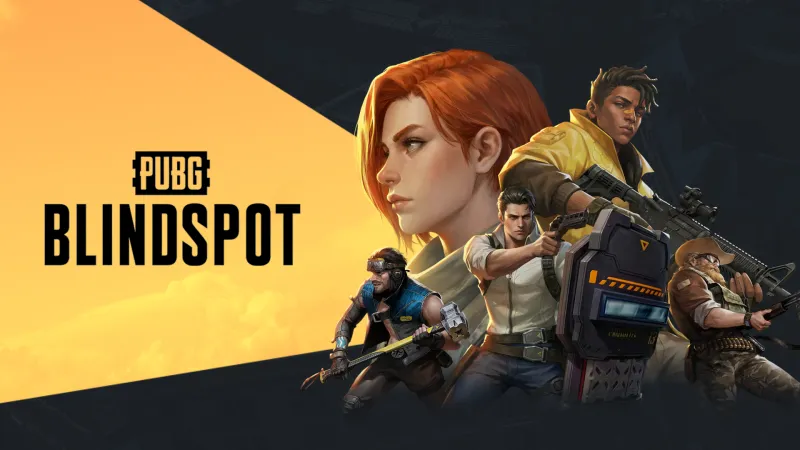
South Korean video game publisher Krafton, Inc. has announced that PUBG: Blindspot, the free-to-play 5v5 tactical shooter developed by PUBG Studios, is now available on Steam via Early Access. The team describes the game as being "designed around fast, high-intensity indoor firefights" that mix close-quarters battles and team-based strategies with a top-down perspective.
Krafton, which made headlines last October after touting that it would transform into an "AI-first company," says in a press release that today's Early Access launch marks the beginning of an open development phase, "with the development team actively working alongside players to refine gameplay systems and expand content" ahead of the game's 1.0 release. PUBG Studios adds that player feedback will play a central role in shaping the game with updates designed around depth, balance, and quality.
PUBG: Blindspot Maps
PUBG: Blindspot is the first spinoff of the mega-popular battle royale grandfather (though that's a heavily debated topic), PUBG, and takes place decades after the events of the original game. The head of the IP, Taesok Jang, says, "Starting with PUBG: Blindspot, the PUBG IP will continue to expand into new genres and platforms."
Today's launch precedes Competitive Season 1, which will launch next week on February 12. You can download the game right now on Steam, or play the game via Nvidia GeForce Now streaming.
PUBG: Blindspot Characters
If you've played any of the game's betas, you'll find some new content in today's Early Access release, like a defense-exclusive character with Molotov-based arena control, according to the press release.
Are you going to check out PUBG: Blindspot? Let us know in the comments below!
Nekome: Nazi Hunter Is A Grindhouse-Inspired Action Game Where You Brutally Kill A Lot of Nazis

ProbablyMonsters, the studio behind last year's Storm Lancers, has revealed Nekome: Nazi Hunter, a third-person action game where – you guessed it – you kill a lot of nazis. The game's release date and playable platforms remain to be announced, but if the idea of getting revenge against nazi soldiers during World War II sounds like a great time, it's a game you might want to keep an eye on.
"In Nekome: Nazi Hunter, players step into the role of Vano Nastasu, a young Romani man consumed by grief after the brutal murder of his family by nazi soldiers," a press release reads. "The game follows Vano's transformation from hunter to hunter as he embarks on a violent personal odyssey of revenge across war-torn Europe."
Check out the Nekome: Nazi Hunter announcement trailer below:
ProbablyMonsters says its game approaches the Second World War from a personal perspective, as you play as Vano, a man not trying to end the war (though I imagine he'd like to do that), but set on exacting revenge on every nazi he comes across. To do so, players will "scout enemy routes, plan their assaults, and strike with precision in a mix of stealth and brutal, up-close combat." If the trailer above is any indication, the combat is indeed brutal, violent, and bloody.
The studio says Nekome: Nazi Hunter's visuals are inspired by grindhouse cinema and that the game features visceral combat, complete with grounded finishing moves. Though the announcement trailer is short, the screenshots below might give you a better look at what to expect in the game:
More information about Nekome: Nazi Hunter will be released at GDC next month.
What do you think of Nekome: Nazi Hunter's reveal? Let us know in the comments below!
Overwatch 2 Is Just 'Overwatch' Again And Five New Heroes Arrive Next Week
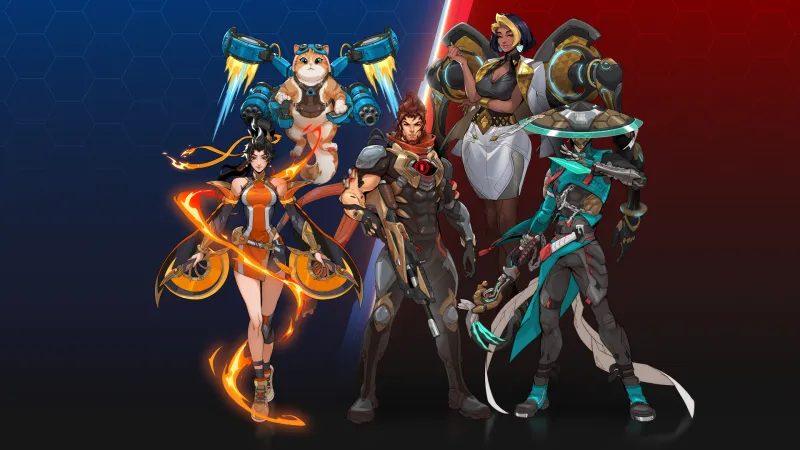
Ahead of today’s Overwatch Spotlight 2026 event, I flew to Blizzard’s headquarters to go hands-on with all of the updates and additional content coming in the first season of Reign of Talon, a year-long story arc that kicks off on February 10. Overwatch 2, which Blizzard is officially renaming to Overwatch alongside the update, finally feels fresh again thanks to the five new heroes launching alongside Season 1. Additionally, the first-person shooter’s new sub-roles help to further distinguish its Tank, Damage, and Support heroes with new passive buffs that better align with their specific playstyle and class identity.
The team is getting better and faster at creating heroes, multiple developers told me, enabling them to commit to launching 10 heroes in 2026. Players can expect one new hero to launch with each Reign of Talon season, each introducing other game updates like character reworks, new maps, and quality of life changes.
We’ve detailed each new character below, along with the new sub-role passives further down.
We Played Overwatch's Five New Heroes:
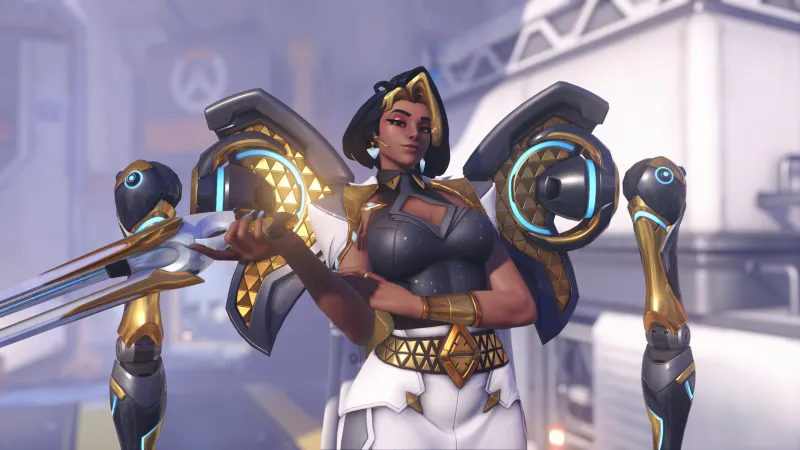
Domina (Tank)
Heiress and vice president of Vishkar Industries, Domina is a zone control tank who uses a variety of medium and long-range abilities to poke enemies from afar. One of her major perks allows her to use her Sonic Repulsors to push enemies into her own shield wall, stunning them and dealing 100% increased damage.
Primary Fire: Photon Magnum - Medium-range beam that culminates in a high-impact shot
Barrier Array - A segmented hard-light barrier deployed in front of Domina. Each segment must be individually destroyed, creating dynamic defensive angles
Crystal Charge - Project an explosive crystal and reactivate to detonate it
Sonic Repulsors - Push enemies back, stunning them if they hit a wall
Ultimate: Panopticon - Fire a hard-light projectile that imprisons enemies and detonates on expiration
Passive: Reconstruction - Dealing damage with abilities restores shields
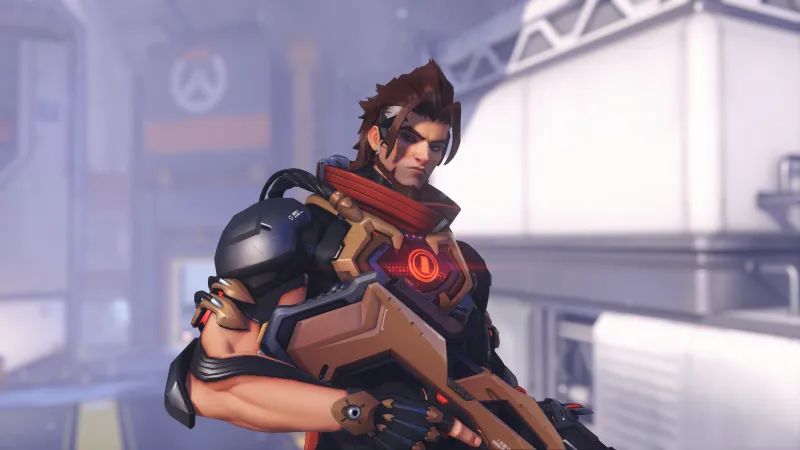
Emre (Damage)
Once the Overwatch program's gold standard, Emre is a conflicted sharpshooter currently serving Talon. His cyber frag explodes after bouncing, allowing Emre to propel himself to higher ledges.
Primary Fire: Synthetic Burst Rifle - Three-round burst weapon
Secondary Fire: Take Aim - Hold to zoom in, tightening accuracy and increasing fall off range
Siphon Blaster - Temporarily wield a semi-auto pistol with life-stealing explosive rounds. Move faster and jump higher while wielded
Cyber Frag - Throw a grenade that detonates shortly after bouncing
Ultimate: Override Protocol - An override initiates, transforming you into a living weapon. Fires rapid, explosive blasts or charged mega-shots capable of wiping out teams
Passive: Altered Vitals - Passive health regeneration activates sooner and instantly restores 30 health when activated
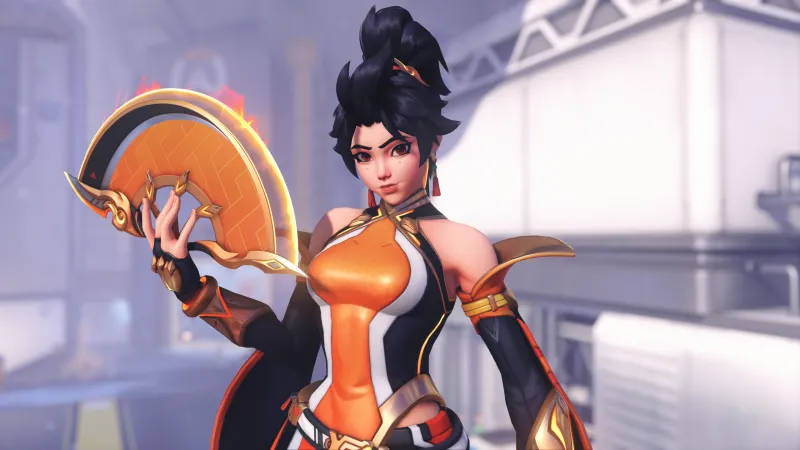
Anran (Damage)
My favorite damage character of the bunch, Anran is the older sister of Wuyang and is a potent burst character. Her ultimate can be used dead or alive, and helps to quickly set enemies on fire alongside her fiery fans that ignite enemies and stoke the fires with ample oxygen.
Primary Fire: Zhuque Fans - Hand fans that shoot fiery projectiles
Secondary Fire: Fan the Flames - Hot wind blast that amplifies burning damage
Inferno Rush - Propel yourself forward and damage enemies you impact
Dancing Blaze - Strike nearby enemies while dodging all damage
Ultimate (Alive): Vermillion Ascent - Charge forward, exploding on impact and instantly igniting enemies
Ultimate (Dead): Vermillion Revival - Revive yourself in a fiery explosion
Passive: Ignition - Hit enemies with fire attacks to burn them
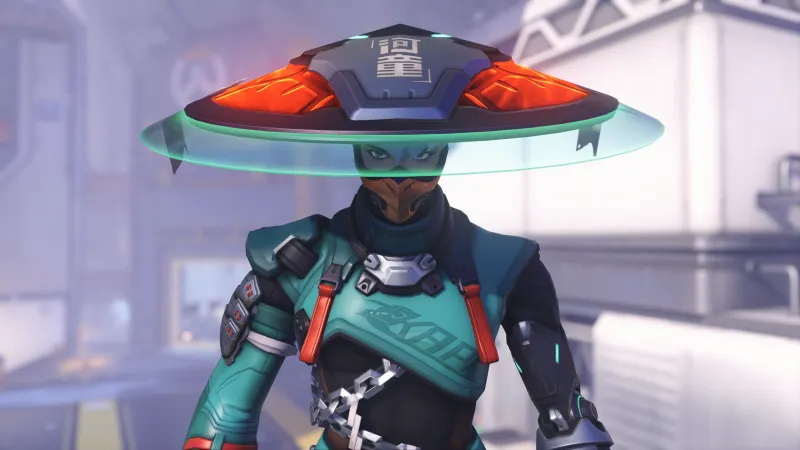
Mizuki (Support)
This young ninja specializes in locking down enemies, deflecting bullets with his ultimate, and healing allies with his traditional Japanese hat called a Kasa. Mizuki can return to a previous location by marking it with a paper doll. Importantly, Mizuki's healing aura must be maintained by continuously dealing damage and healing allies, requiring players to stay on the front line.
Primary Fire: Spirit Glaive - Throw a spinning blade that can bounce off walls, impacting enemies, and deals damage
Healing Kasa - Throw your hat to heal an ally, bouncing to nearby allies and healing you when it returns
Katashiro Return - Leap forward, leaving behind a paper doll. Reactivate to return and gain increased movement speed while active
Binding Chain - Launch a tethering chain that hinders the first enemy hit
Ultimate: Kekkai Sanctuary - Create a sanctuary that heals allies and absorbs enemy projectiles from outside the area
Passive: Remedy Aura - Heals nearby allies. Healing scales with a resource generated by dealing damage and healing
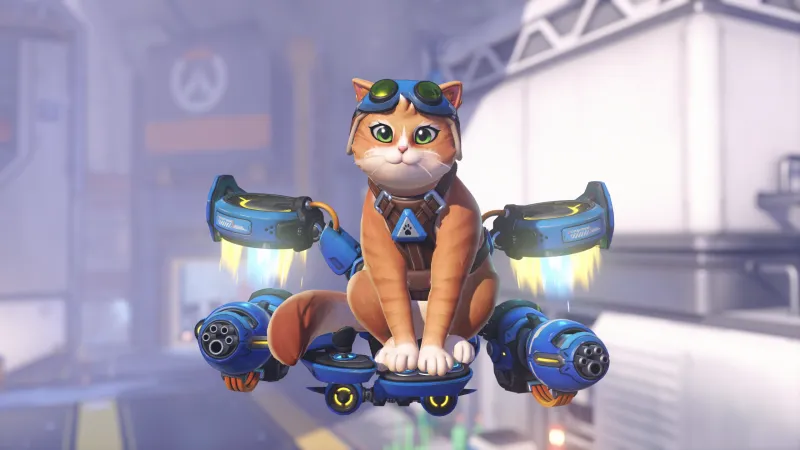
Jetpack Cat (Support)
The long-teased Jetpack Cat is finally real. Her ability to tow allies and enemies makes for a ton of clever plays, and her major perk allows her to knock enemies back if she flies fast enough into them.
Primary Fire: Bionic Pawjectiles - Mid-range projectile spread that heals allies and damages enemies
Lifeline - Toggle into transport mode, allowing an ally to be towed, increases movement speed, and heals your ally
Frenetic Flight - Accelerate in your movement direction. Fuel recovery is slower while carrying another player
Purr - Pulsing area heal that increases in frequency over time. Knockback nearby enemies when activated
Ultimate: Catnapper - Dive towards a ground location, knocking down enemies and tethering the nearest one to you
Passive: Jetpack - Permanent flight
New Sub-Roles and Passives:
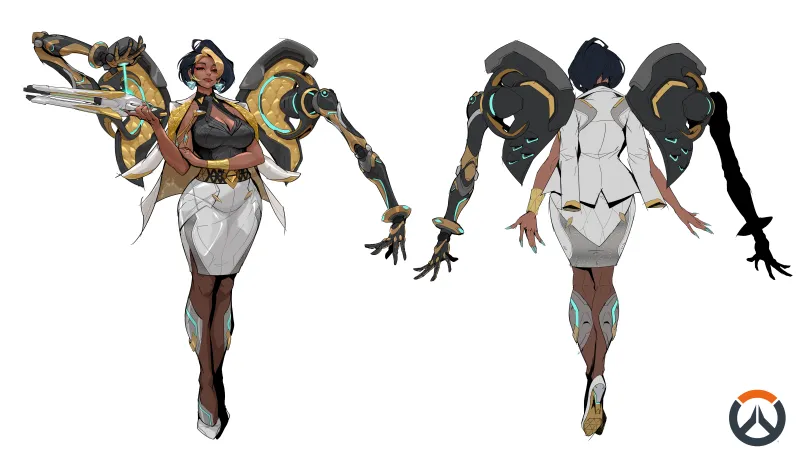
Tank
Bruiser: Reduces critical damage received. While at critical health, gain movement speed
- Roadhog, Zarya, Orisa, Mauga
Initiator: Staying airborne lightly heals you
- D.Va, Winston, Doomfist, Wrecking Ball
Stalwart: Reduces knockbacks and slows received
- Reinhardt, Sigma, Ramattra, Junker Queen, Hazard, Domina
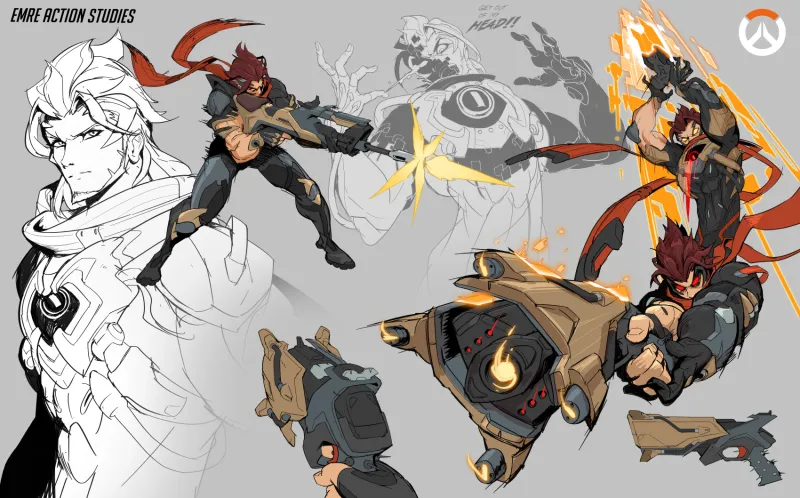
Damage
Sharpshooter: Critical hits reduce ability cooldowns
- Hanzo, Widowmaker, Cassidy, Ashe, Sojourn
Flanker: Health packs restore more health
- Tracer, Reaper, Genji, Vendetta, Venture, Anran
Specialist: Eliminating an enemy briefly increases reload speed
- Bastion, Junkrat, Mei, Soldier 76, Symmetra, Torbjorn, Emre
Recon: Detect enemies below half health through walls after damaging them
- Pharah, Sombra, Echo, Freja
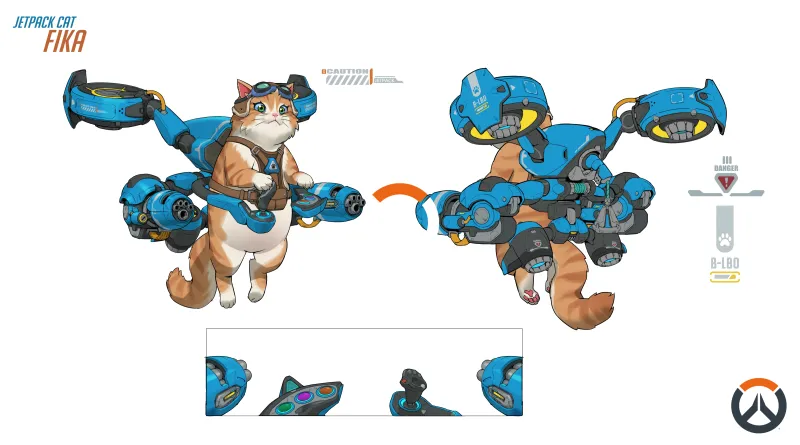
Support
Tactician: Gain excess ultimate charge that carries over after using your ultimate
- Lucio, Zenyatta, Ana, Baptiste, Jetpack Cat
Medic: Healing allies with your weapon also heals you
- Mercy, Moira, Kiriko, Lifeweaver
Survivor: Using a movement ability activates passive health regeneration
- Brigitte, Illari, Juno, Wuyang, Mizuki




